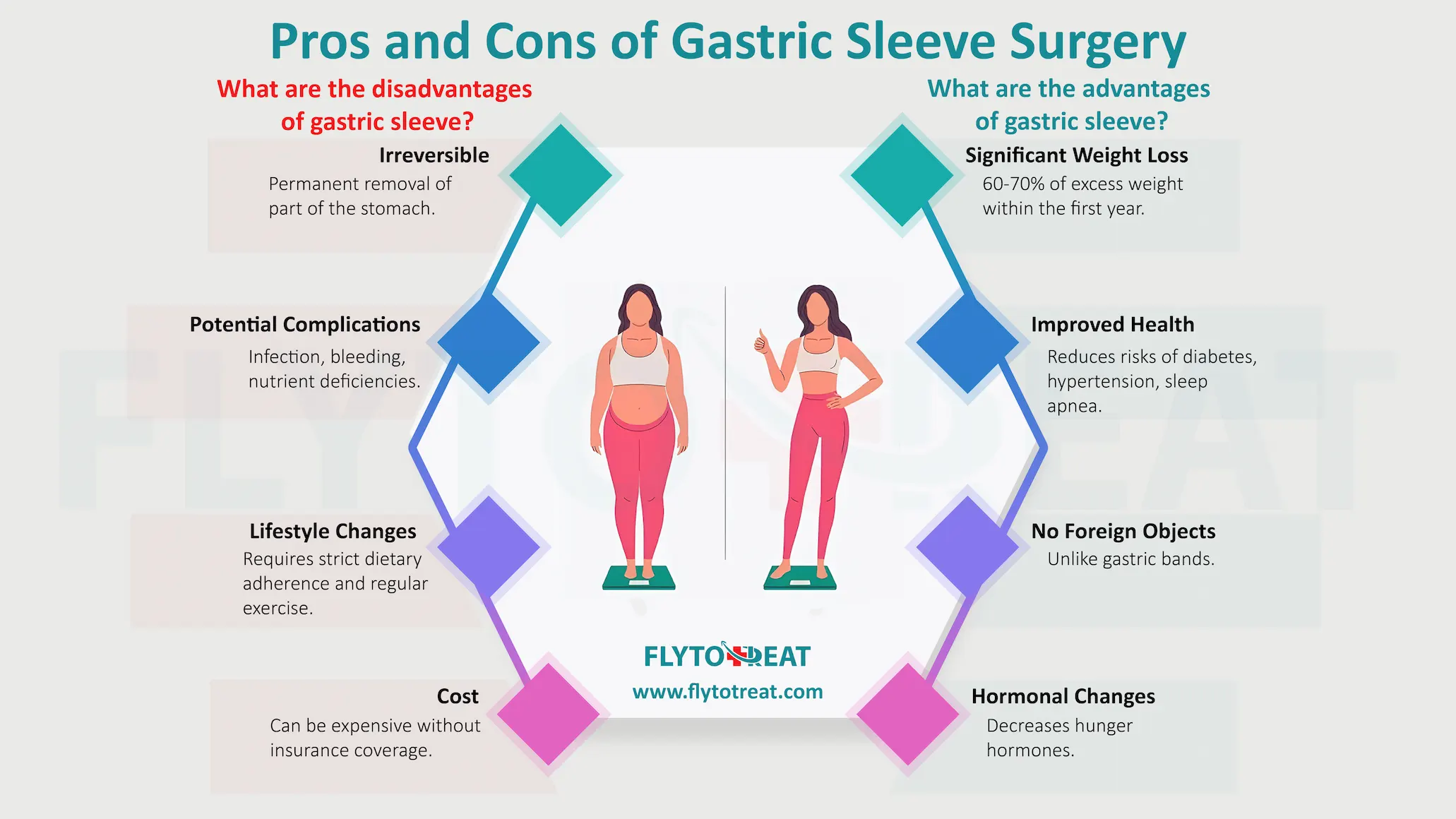
What are the benefits of getting the gastric sleeve?
Exploring the advantages of gastric sleeve surgery is essential for anyone considering this life-changing procedure. At FlyToTreat, we are dedicated to helping you understand the benefits and the challenges you might face. This article delves into various aspects such as the long-term side effects of gastric sleeve and answers critical questions like "What are the pros and cons of gastric sleeve?" to help you make informed decisions.
What's Sleeve Surgery? Understanding Gastric Sleeve Gastrectomy
Sleeve surgery is a type of weight-loss surgery for people with clinically severe obesity. Sleeve surgery is a significant decision and should only be considered after exploring other weight-loss methods. But here's a breakdown:
• Procedure: The surgeon removes about 75-80% of the stomach laparoscopically, using small incisions and surgical tools inserted through the abdomen. This remaining portion is then shaped like a sleeve.
• Reduced Stomach Volume: The smaller stomach pouch limits the amount of food you can eat at once, leading to reduced calorie intake and promoting weight loss.
• Appetite Regulation: The removed portion of the stomach also produces a hormone called ghrelin, which stimulates hunger. One of the advantages of gastric sleeve surgery is that by eliminating this section, the surgery may help regulate appetite.
Advantages of gastric sleeve surgery
The advantages of gastric sleeve surgery are manifold, presenting a diverse array of benefits for individuals grappling with obesity:
• Significant Weight Loss: Studies show an average excess body weight loss of 60-70%, promoting improved mobility and overall health.
• Reduced Hunger Hormones: The portion of the stomach removed during surgery also produces ghrelin, a hormone that stimulates hunger. This reduction can lead to decreased appetite and feelings of fullness, aiding weight management.
• Improved Health Implications: Significant weight loss has the potential to greatly alleviate or even resolve obesity-associated conditions such as type 2 diabetes, sleep apnea, and hypertension
• Minimally Invasive: Laparoscopic surgery uses small incisions, leading to faster recovery times, less pain, and fewer scarring risks compared to traditional open surgery. ESG is even more noninvasive
• Potential for Long-Term Success: Research suggests that weight loss achieved through gastric sleeve surgery can be sustained long-term with proper dietary and lifestyle changes.
These are just some of the potential advantages of gastric sleeve surgery. It's essential to weigh the benefits against the risks and side effects before deciding.
Am I a good candidate?
Although gastric sleeve surgery can be highly effective for weight loss, it's unsuitable for everyone. A good candidate should have some critical characteristics. First, a Body Mass Index of 40 or higher is required. In certain instances, individuals with a BMI ranging from 35 to 39, coupled with severe weight-related health issues, may meet the criteria. Typically, providing documented evidence of efforts toward weight reduction through dietary changes and physical activity within a specified duration is necessary. It would help if you also had good overall health without primary medical conditions that could make surgery high-risk.
Besides, Gastric sleeve surgery is a starting point, not a quick fix. A commitment to healthy eating habits and exercising regularly is required for Long-term success. While significant weight loss is likely, it's essential to have realistic expectations about the timeline and effort required.
A doctor can assess your situation and determine if you're a good candidate for gastric sleeve surgery. To expand your knowledge, see the flytotreats article on gastric sleeve candidacy.
Why is a gastric sleeve better than a gastric bypass?
Both gastric sleeve and gastric bypass are effective weight-loss surgeries but have some key differences. Here's why the advantages of gastric sleeve surgery might be considered preferable for some patients:
• More straightforward Procedure: The sleeve is a less complex surgery than the bypass, potentially leading to a shorter operating time, faster recovery, and fewer potential complications.
• Reduced Malabsorption: The sleeve doesn't bypass any part of the small intestine, so there's a lower risk of nutrient deficiencies than bypass surgery.
• Hormonal Regulation: The sleeve preserves the part of the stomach that produces ghrelin, a hunger hormone. While this might lead to slightly slower weight loss initially, it may also result in a more natural feeling of fullness in the long term.
Deciding between gastric sleeve and bypass surgery depends on individual factors. Consult a bariatric surgeon to understand the pros and cons of each procedure and determine which option best suits your specific needs and health profile.
What are the pros and cons of gastric sleeve?
Gastric sleeve surgery offers a potential solution for significant weight loss, but it's a major decision. Here we take a close look at gastric sleeve advantages along with its potential disadvantages:
Pros:
• Effective Weight Loss: Studies show significant weight loss, with an average of 60-70% of excess body weight shed within a year.
• Reduced Hunger: The procedure removes a portion of the stomach that produces ghrelin, a hunger hormone, potentially leading to decreased appetite and feelings of fullness.
• Minimally Invasive: Laparoscopic surgery uses small incisions, leading to faster recovery times and less pain compared to traditional open surgery. Endoscopic sleeve gastrectomy is the most noninvasive type of bariatric surgery.
• Enhanced Health Benefits: Significant weight loss has the potential to greatly enhance or even eliminate obesity-related ailments such as type 2 diabetes, sleep apnea, and hypertension.
• Potential for Long-Term Success: With proper diet and exercise, weight loss achieved through gastric sleeve surgery can be sustained in the long run.
Cons:
• Irreversible Procedure: The removed portion of the stomach during VSG cannot be regrown, making the surgery permanent.
• Risk of Complications: As with any surgery, there are potential risks like infection, bleeding, and leaks.
• Dietary Changes: Following a strict post-surgical diet is crucial for successful weight loss and to prevent malnutrition.
• Nutrient Deficiencies: While less common than with bypass surgery, there's a slight risk of vitamin and mineral deficiencies, requiring long-term supplementation.
• Not a Quick Fix: While weight loss is expected, it's gradual, and long-term commitment to healthy habits is essential.
• Temporary hair loss: Some patients may experience hair loss after gastric sleeve due to stress on the body after the surgery and corresponding lifestyle changes. You can also check out FlytoTreat's article about vitamins to take after bariatric surgery

Gastric sleeve side effects years later
Gastric sleeve surgery can be a life-changing tool for weight loss, but some side effects can linger years later:
• Deficiency of Nutrients: Iron, vitamin B12, or calcium deficiencies may develop over time. Regular blood tests and taking prescribed supplements are crucial for long-term health.
• Reflux or Heartburn: While some patients experience heartburn initially, it can persist in some cases years later. Lifestyle changes and medications can help manage these symptoms.
• Weight Regain: Long-term success requires a commitment to healthy habits. Some studies suggest a slight weight regain may occur several years after surgery. In rare cases, the remaining stomach pouch may gradually stretch over time, leading to slower weight loss or even some weight regain.
• Hernias: There's a small risk of developing an incisional hernia around the surgical sites years later. Early detection and repair are essential.
• Psychological Adjustments: Significant weight loss can impact emotions and self-image. Long-term support can help with these adjustments.
These side effects are possible, but not everyone will encounter them. Regular follow-up with your doctor is essential to monitor your health, address any issues, and ensure long-term success after gastric sleeve surgery.
Cost of gastric sleeve
The cost of gastric sleeve surgery can range from $3,800 in countries like Iran to $26,000 in the USA, reflecting significant global disparities. Several elements impact the price, including:
• Facility Type: Whether performed in a hospital or clinic.
• Geographic Location: Costs can vary widely even within the same country.
• Surgeon Proficiency: Surgeons with greater experience generally command higher fees.
Insurance coverage significantly affects out-of-pocket expenses, but terms can vary widely. Post-Surgery Costs Include medications and follow-up visits, essential for successful outcomes.
Ultimately, Weighing the advantages of gastric sleeve surgery against potential financial burdens is crucial.
For further explorations on gastric sleeve cost, please check our product page. This aims to equip you with a comprehensive understanding of the medical and non-medical packages of gastric sleeve surgery, ensuring you make an informed decision based on cost and quality considerations.
conclusion
Understanding the pros and cons of gastric sleeve is crucial for anyone considering this surgery. FlyToTreat provides essential support and information to help navigate the complexities of the procedure, including potential long-term side effects. While the benefits of significant weight loss and improved health outcomes are substantial, it is essential to consider all factors, including the need for ongoing lifestyle adjustments. This balanced approach ensures that you are well-prepared for the decision you want to make.
MEDICALLY REVIEWED BY: Dr. Ali Bazazi
AUTHOR: FlytoTreat's team of Authors
23 April 2024 - Updated At: 02 December 2024
Related Articles
Comment






